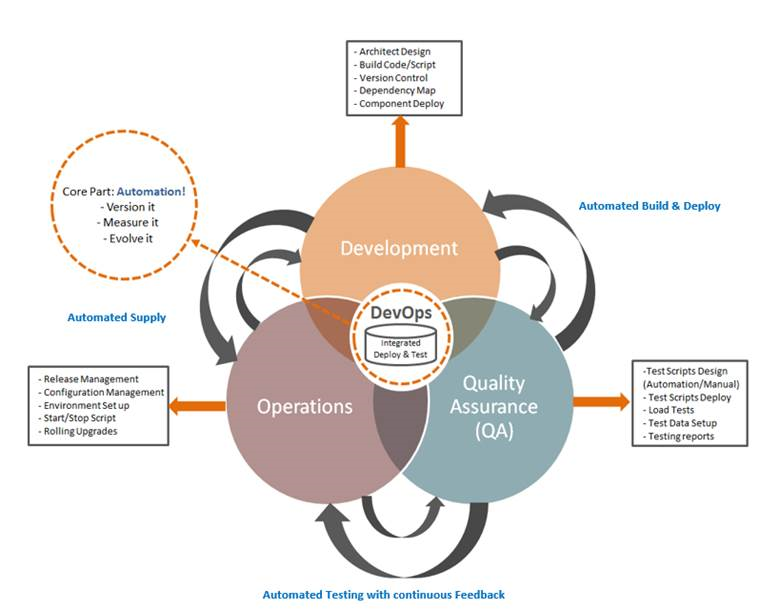The Role of QA in DevOps World

Speed is of the essence. How fast can you get a new product into the market?
How quickly can you fix a defect or adapt a feature? What is the best way to achieve this speed, without compromising on quality? Automation is essential, however increasingly organizations are finding DevOps as a key to delivering the right product within the right time.
In today’s moderately competitive IT world, DevOps becomes so popular with the implementation of Agile by facilitating RAD (Rapid Application Development) in a better way, to accelerate the delivery with better quality and business outcomes.
DevOps is an extension of a software development approach driven by Agile methodology, which makes it possible for software development and testing to be carried out simultaneously, along with continuous collaboration between all the stakeholders involved. DevOps today is driving organizations to streamline and speed up application delivery, and incorporating changes and innovation along the way. One must understand that DevOps isn’t just about continuous delivery, but also about achieving the highest quality standards through continuous improvement of the software.
The goal of adopting DevOps practices is to improve the regularity of the releases and also to reduce the defects to deliver high quality end product. It’s a methodology that facilitates development and deployment of applications which is rapid, short and iterative.
Role of QA in DevOps world
In the DevOps approach, QA and DEV play equal significant roles. QA connects development and operations teams to deliver the end product with high quality.
In the traditional approach, Quality comes at the end of the software development cycle, while in DevOps it comes in at every level. Here QA becomes part of the development team and testing becomes a parallel activity to software development. Hence, testing activity is now a shared responsibility and the Quality is owned by the entire development (Dev + QA) team.
The role of QA is integral part of DevOps cycle, which revolves around at every stage of developing a product to explore, discover, and provide continuous feedback. Having said that, QA always tries to assure quality software and lower the risk as early in the process as possible.
Below diagram illustrates the major functions of DevOps, along with their interaction flow, and key responsibilities of each team.

Automation is what we often associate with DevOps, and it naturally plays a key role:
- Automate deployment process, so that software can deploy with speed;
- Automate test cases, so that software can deploy with confidence.
QA is all about moving into a more strategy-driven role, building powerful and effective software testing infrastructure and tracking quality across the SDLC at the same time.
For QA, the points that need to be adhered to in a DevOps cycle, are as follows:
- Aligning their efforts in the DevOps cycle.
- Automating test cases with maximum test coverage
- Ensuring standardization of Test Environments and Automation of Deployment on QA boxes.
- Ensuring automation of all the tasks before and after testing including cleanups etc., along with their alignment with the Continuous Integration cycle.
Conclusion:
The primary objective of DevOps testing is deriving quality outcomes that are accompanied by software development (SDLC) and beyond. It is a continuous improvement cycle that helps to increase an organization’s speed to deliver a product.
DevOps is a future, which everyone needs to embrace, understand and inculcate it.
